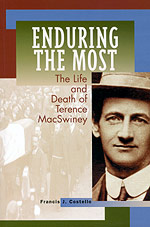
Terence
MacSwiney's seventy-three-day hunger strike in Brixton
prison in 1920 marked a turning point in Ireland's
struggle for
independence. His
courage and purpose made a profound impression on Irish and world opinion, and
still echo through Irish political life.
A member of the Provisional Government, Lord Mayor of Cork, and Commander of the Cork No. 1 Brigade of the IRA, MacSwiney was one of the leading republican activists of his generation. He was also a writer of plays and political works, including The Principles of Freedom, and left a body of writing that encompassed poetry, political philosophy and ideas for Ireland's economic development.Francis J. Costello's bestselling biography, the first to have full access to the MacSwiney family papers, creates a rounded portrait of MacSwiney's character and beliefs. It explores his life in all its complexity, and is at once the story of one of history's martyrs and a record of Ireland's revolutionary years.
THE
AUTHORA member of the Provisional Government, Lord Mayor of Cork, and Commander of the Cork No. 1 Brigade of the IRA, MacSwiney was one of the leading republican activists of his generation. He was also a writer of plays and political works, including The Principles of Freedom, and left a body of writing that encompassed poetry, political philosophy and ideas for Ireland's economic development.Francis J. Costello's bestselling biography, the first to have full access to the MacSwiney family papers, creates a rounded portrait of MacSwiney's character and beliefs. It explores his life in all its complexity, and is at once the story of one of history's martyrs and a record of Ireland's revolutionary years.
Francis Costello was educated at St Mary's College, Galway, and holds degrees from Fordham University, New York University and Boston College. A frequent contributor to historical journals, he won the Irish-American Cultural Institute's Four Masters Award for modern Irish historical writing for his work on the 1921 Anglo-Irish Treaty. He has worked in business and government in the USA, acted as chief of staff to Congressman Joseph Kennedy and is currently chairman of Boston Irish Ventures, as well as being one of the architects of the Technology Fund for Ireland proposal announced by the Clinton administration in 1995. He is married to Anne O'Connor and they have two sons, Owen and Emmet.